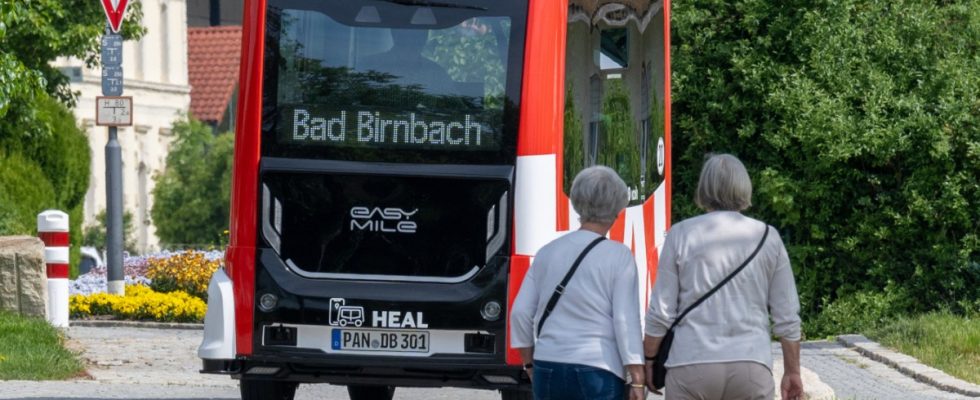It is a good half hour on foot from Murnau train station to the accident clinic, or maybe ten minutes by bike. If you don’t have a bike with you, if you don’t like cycling at all or if you’re not very good on foot, you could take the Murnau Omobi call bus, which has received many awards, until a few days ago. However, the Murnau municipal council recently let the contract for this on-demand bus expire in the long-term local political dispute with Mayor Rolf Beuting (ÖDP). There is no alternative in the foreseeable future, so that the people in Murnau are currently without any public transport. Omobi was a pioneer of on-demand traffic, which is considered a future solution especially for rural areas. Similar projects are gaining momentum elsewhere.
Just a few weeks ago, almost 80 representatives from all kinds of municipalities received information from the Bavarian Ministry of Transport about such on-demand solutions and their funding. So far, the Free State has made a total of 15 million euros available for this. “Flexible offers, such as on-call buses, can help to make public transport more attractive, especially in rural areas,” affirmed Transport Minister Christian Bernreiter (CSU).
According to the Ministry, the usual regular bus service “mostly makes only limited sense economically and ecologically in rural areas”. The “demand-oriented forms of operation” are completely different – mostly minibuses, which are only on the road when ordered individually by telephone or mobile app and bundle the respective wishes and routes of the users as effectively as possible. According to the ministry, they are “an ideal way of providing a flexible and comprehensive range of public transport services, especially in rural areas” and “particularly of closing gaps in the range of services in rural regions that have so far been less well developed”. In order to promote on-demand local transport, Bernreiter announced that he would set up a “Sustainable Mobility” team at the Bavarian Railway Company (BEG). So far, the BEG has mainly ordered and controlled regional rail transport for the Free State.
Deutsche Bahn is also involved in the development of on-demand solutions. Because if you have to get into your own car to get to the next train station, you may be able to cover the entire distance in it. Call buses, on the other hand, could bring DB customers to the train station, according to the group’s calculations. Deutsche Bahn has implemented this concept at Chiemsee, among other places, where the “Rosi” on-call buses have been serving eleven communities with a total of 50,000 inhabitants in the Rosenheim district for a year. The offer is popular and has been considered a success so far. However, Rosi will probably cost significantly more than originally planned. In the first few months, many passengers used the buses on order less as a supplement to the existing bus lines and more as a substitute for taxis on short distances within larger communities, so that the vehicles often hardly made it into more remote areas.
Until the end of June, the Murnau Rufbus Omobi picked up passengers who had ordered them by phone or mobile app.
(Photo: Omobi)
Drivers are a major cost factor in on-demand transport, which is why the industry’s long-term hopes are pinned on driverless buses. A pilot project with autonomous e-buses in Bad Birnbach, Lower Bavaria, has just gone into regular operation after a one-year test phase. The bus serves 20 fixed stops there on demand, for example at hotels, the church, the school or a facility for assisted living. According to Mayor Dagmar Feicht (CSU), around 7,800 passengers used this service in the first year – but with a good 5,000 individual journeys, which means an average of 1.7 passengers per journey and thus does not quite correspond to the goal of bundling the journeys .
It’s “about mobility for everyone, especially in rural areas,” says Birnbach’s mayor, in agreement with the transport minister. He announced that the Free State would continue to support the project with 45 percent of the costs. In addition, since 2017 there has been a shuttle bus between the train station, the thermal baths and the market square in Bad Birnbach that drives itself but is accompanied by a human, and has been used by around 87,500 passengers.
Whether there will soon be on-demand traffic again in Murnau is the subject of a referendum on July 23, which was pushed through by an alliance of senior citizens’ advisory board, youth representatives, business development association and other associations. If yes, Omobi could continue after a few weeks with a renewed concession. What solution could eventually follow a no is completely open.

